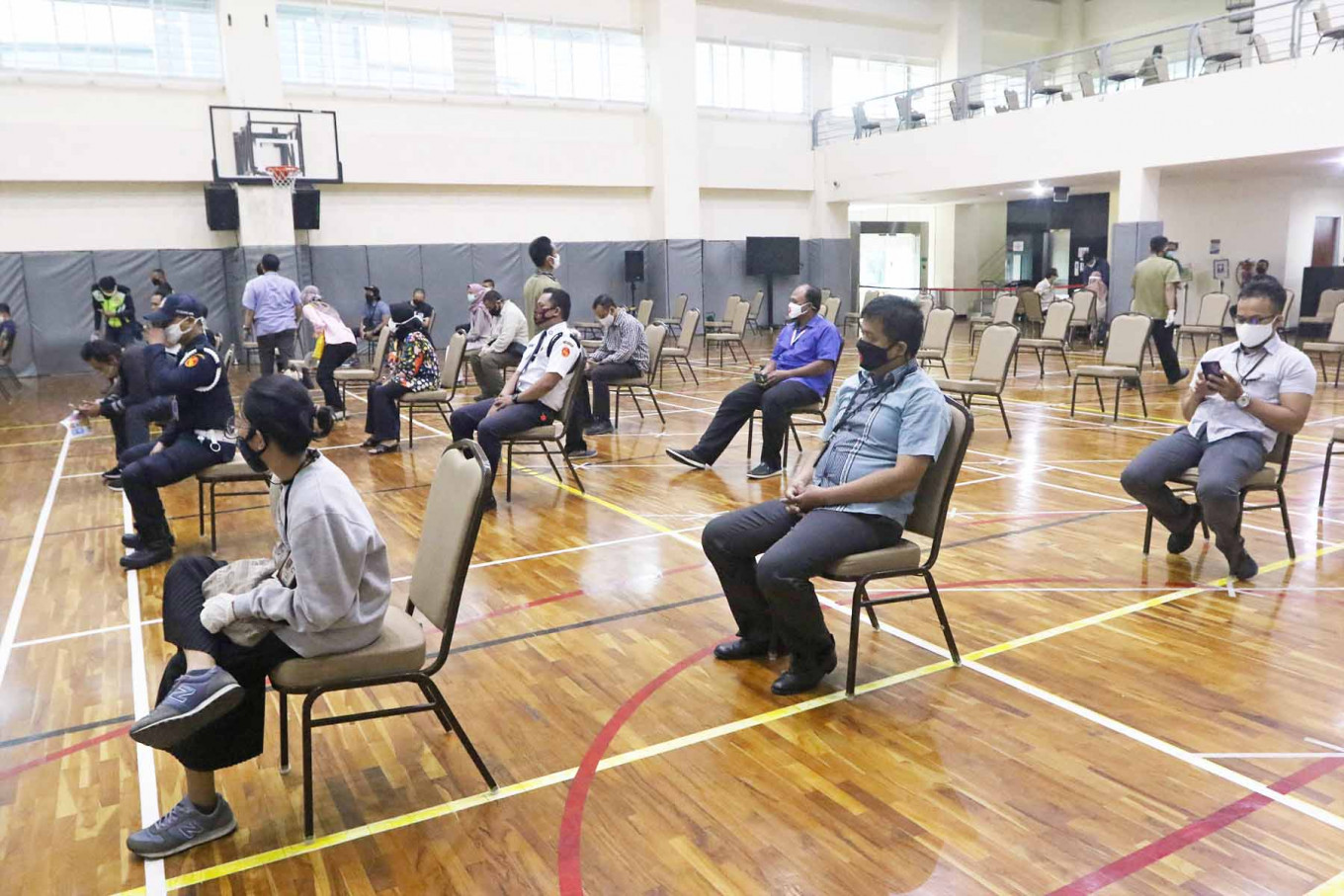Popular Reads
Top Results
Can't find what you're looking for?
View all search resultsPopular Reads
Top Results
Can't find what you're looking for?
View all search resultsLargest cluster in Jakarta at Health Ministry
Change text size
Gift Premium Articles
to Anyone
I
n a somewhat ironic turn of events amid the country’s fight against COVID-19, the Health Ministry office in Kuningan, South Jakarta, turns out to be the largest virus cluster in the capital, according to local health officials.
A data visualization by the Jakarta administration shows that the ministry had 252 confirmed cases as of Friday, more than any other cluster across the capital, including offices, traditional markets and places of worship.
Other government offices are also recorded among those with the most cases, namely the Transportation Ministry (175), the Corruption Eradication Commission (106), the Food and Drug Monitoring Agency (89), the Tanjung Priok Marine and Coast Guard Base Class I (88) and I-News TV (87).
A number of high-ranking government officials are also among those infected with the virus. Jakarta secretary Saefullah died on Wednesday after testing positive for COVID-19 and being treated at hospital. General Elections Commission (KPU) chairman Arief Budiman, who is busy preparing the December regional elections, has also tested positive for the virus.
Dicky Budiman, an Indonesian epidemiologist at Australia's Griffith University, said the fact that there was a high number of cases in the Health Ministry was a sign of ineffective health protocols that leave room for transmission.
“There is a false perception about health protocols. People think physical distancing, wearing a mask and washing hands is enough but it will be ineffective without routine screening every two weeks for people who travel outside or work at the office to ensure they don’t carry the virus around,” Dicky told The Jakarta Post on Friday.
Masdalina Pane of the Indonesian Epidemiologists Association (PAEI) said an epidemiological investigation must be carried out to determine how transmission occurred among those infected in a cluster. She said transmission might occur at the office or other places such as public transportation.
As the large-scale social restrictions (PSBB) being reimplemented in Jakarta starting Monday would not be as strict as the previous PSBB regime, Dicky said testing was a vital condition to curb transmission. “We are all carrying the virus unless proven otherwise. That should be people’s mindset at this point,” he said.
Jakarta reinstated the PSBB amid rising cases and deaths ever since the city began to transition to the “new normal” in June. Most of the cases have occurred in offices, raising concerns about poor implementation of health protocols in workplaces across the city.
Other government offices where clusters have emerged include the Communication and Information Ministry with 65 cases, the Defense Ministry (64), the Finance Ministry (61) cases, the Youth and Sports Ministry (43), the Tourism and Creative Economy Ministry (38), the Law and Human Rights Ministry (35) and the Education and Culture Ministry with 25 cases. Fifteen ministries have recorded fewer than 20 cases.
Dicky said the Health Ministry should be a role model in the implementation of public health protocols to assure that the country could win the battle against the virus. “The ministry must evaluate the implementation of its health protocols. It must be ineffective since there are many confirmed cases among its employees,” he said.
Responding to the finding, the Health Ministry’s disease control and prevention director general, Achmad Yurianto, said the high number of infected staff members did not necessarily mean the ministry’s headquarters had become a cluster or the source of an outbreak.
“If cases are recorded at the Health Ministry, does that mean we're calling it a Health Ministry cluster?” he told the Post. “This is accumulative data since May. The ministry’s employees live in Greater Jakarta and commute every day”.
He also said the ministry had been conducting routine tests for its employees. “Health Ministry employees undergo swab tests every month and those who test positive [for COVID-19] immediately go into isolation,” said Achmad.
Administrative and Bureaucratic Reform Minister Tjahjo Kumolo asked the staffing officers (PPK) in all ministries, agencies and local administrations to monitor health protocol implementation among civil servants to curb rising cases at government offices.
“The PPK must monitor as well as regularly report the effectiveness of such implementation and the working hours division for civil servants every week,” Tjahjo said.










